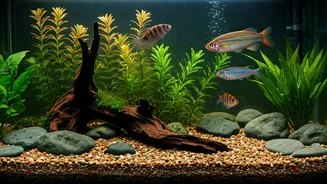Introduction to Long-Lived Fish
Choosing the right fish is crucial for aquarium success, especially when considering longevity. Many aquarium enthusiasts prefer fish that can become long-term
companions. Several freshwater species fit this description and are relatively easy to care for, making them perfect for beginners. The following sections will introduce five such fish, providing crucial information about their needs, potential lifespan, and suitability for a variety of aquarium setups. These fish can bring joy and beauty to homes for many years with proper care and attention, making them great choices for any new aquarist looking for a long-term commitment.
The Angelfish
Angelfish are renowned for their majestic appearance and graceful movements, making them a popular choice for aquariums. They can grow up to 6 inches in length and can live for 10 years or more with proper care. These fish thrive in taller tanks, where they have enough vertical space to swim comfortably. They prefer a planted aquarium with plenty of hiding spots and a stable water environment. Angelfish are generally peaceful but can be territorial, especially during breeding. So, it's essential to provide adequate space and avoid overcrowding. Feeding them a varied diet, including flakes, pellets, and occasional live or frozen foods, is also essential. Maintaining a consistent water temperature of around 78-84°F is also crucial for their well-being.
The Betta Fish
Betta fish, also known as Siamese fighting fish, are colorful and captivating creatures. They can live for 3 to 5 years, and sometimes even longer, in a well-maintained aquarium. Betta fish are known for their vibrant colors and flowing fins, and they can be kept in relatively small tanks, making them suitable for various living situations. However, Betta fish are solitary by nature and should ideally be kept alone, as they are likely to fight with other male bettas. They need a warm environment with a temperature of around 76-82°F and a well-filtered tank to thrive. Feeding them high-quality betta pellets, supplemented with occasional treats like bloodworms, will keep them healthy. Regular water changes and a clean environment are also essential for their long-term health.
The Plecostomus (Pleco)
Plecos are popular for their algae-eating abilities and are often kept to maintain a clean aquarium environment. They can grow to a considerable size, sometimes exceeding 12 inches, so they need a large tank. Their lifespan can extend beyond 10 years when cared for correctly. These fish are bottom feeders and consume algae, uneaten food, and other organic matter. However, they need a varied diet that includes vegetables and algae wafers to stay healthy. Providing driftwood and hiding places in the tank allows them to feel safe and secure. Plecos also prefer a well-oxygenated environment and clean water conditions. Regular water changes and proper filtration are essential to their well-being. Different species have different needs, so research the specific type of Pleco before bringing it home.
Pygmy Corydoras
Pygmy Corydoras are small, peaceful, and active bottom-dwelling fish that are ideal for smaller aquariums. These fish grow to only about an inch in length and typically live for around 3 to 5 years, sometimes longer. They enjoy living in groups, so it is best to keep them in schools of at least six. They thrive in planted tanks with a sandy substrate, as they enjoy foraging for food in the sand. Pygmy Corydoras are generally peaceful and can be kept with other small, non-aggressive fish. They are not too picky eaters and will accept various foods, including flakes, pellets, and small invertebrates. Maintaining a clean and well-oxygenated tank environment is crucial to their health and longevity. These fish contribute to the aquarium's ecosystem by consuming uneaten food, but regular maintenance is still necessary.
Additional Fish Information
Before choosing an aquarium fish, it is essential to consider the fish's specific needs, including tank size, water parameters, and compatibility with other species. Researching the fish's dietary requirements, preferred habitat, and behavior will ensure that you can provide the best possible care. Choosing a long-lived fish is a great way to add beauty and joy to your home and to enjoy a long-term bond with your aquatic companion. By taking the time to learn about the various fish and their needs, you can set yourself up for aquarium success and enjoy the many benefits of fishkeeping.




















